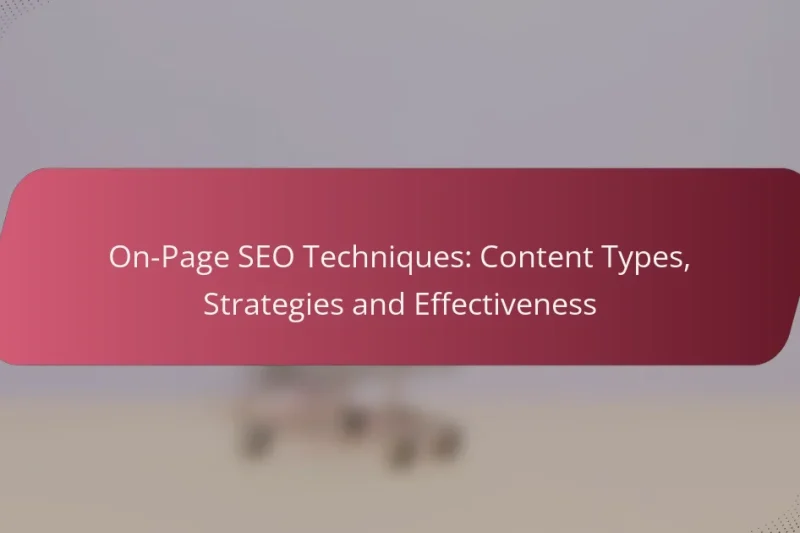Textual content optimization for voice search requires a focus on conversational language and a deep understanding … Textual Content Optimization: Voice Search, User Intent and AccessibilityRead more
SEO Optimization Techniques
SEO optimization techniques are vital for increasing a website’s visibility on search engines, ultimately driving more organic traffic. By implementing a combination of on-page, off-page, technical, content, and local SEO strategies, businesses can enhance their search rankings and attract potential customers effectively.
Keyword Research Tools: Selection, Application and Benefits
Keyword research tools are vital for enhancing online content and boosting search engine visibility. By identifying … Keyword Research Tools: Selection, Application and BenefitsRead more
On-Page SEO Techniques: Content Types, Strategies and Effectiveness
On-page SEO techniques are essential for enhancing the visibility and ranking of web pages in search … On-Page SEO Techniques: Content Types, Strategies and EffectivenessRead more
Textual Content Strategy: Local SEO, Visibility Improvement and Engagement
Effective textual content strategy is essential for enhancing local SEO, which improves a business’s visibility to … Textual Content Strategy: Local SEO, Visibility Improvement and EngagementRead more
SEO Trends: E-commerce Strategies, Content Adaptation and Market Insights
As we move into 2024, e-commerce SEO strategies are increasingly centered on enhancing user experience through … SEO Trends: E-commerce Strategies, Content Adaptation and Market InsightsRead more
Mobile Optimization: Textual Content, User Experience and Performance
Mobile optimization is essential for ensuring that textual content is easily readable and accessible on smaller … Mobile Optimization: Textual Content, User Experience and PerformanceRead more
Meta Tags: Impact, Optimization and Performance Metrics
Meta tags are vital for enhancing SEO performance, as they provide search engines with key information … Meta Tags: Impact, Optimization and Performance MetricsRead more
What are effective SEO optimization techniques?
Effective SEO optimization techniques enhance a website’s visibility on search engines, driving organic traffic. These techniques encompass on-page, off-page, technical, content, and local SEO strategies that work together to improve search rankings.
On-page SEO strategies
On-page SEO strategies focus on optimizing individual web pages to rank higher and earn more relevant traffic. Key elements include using relevant keywords in titles, headers, and meta descriptions, as well as ensuring high-quality content that meets user intent.
Additionally, optimizing images with alt tags and ensuring a mobile-friendly design are crucial. Regularly updating content and improving page load speed can significantly enhance user experience and search engine rankings.
Off-page SEO tactics
Off-page SEO tactics involve actions taken outside of your website to improve its authority and ranking. Building high-quality backlinks from reputable sites is a primary strategy, as search engines view these links as endorsements of your content.
Engaging in social media marketing and influencer partnerships can also boost visibility and traffic. It’s important to monitor your backlink profile regularly to ensure it remains healthy and relevant.
Technical SEO improvements
Technical SEO improvements focus on the backend structure of your website, ensuring that search engines can crawl and index your site effectively. This includes optimizing site speed, implementing structured data, and ensuring a secure connection (HTTPS).
Regularly checking for broken links and optimizing your XML sitemap can enhance crawl efficiency. Utilizing tools like Google Search Console can help identify and resolve technical issues promptly.
Content optimization methods
Content optimization methods aim to improve the relevance and quality of your website’s content. This involves conducting keyword research to identify terms your audience is searching for and integrating them naturally into your content.
Using engaging formats like videos, infographics, and lists can enhance user engagement. Regularly updating existing content to keep it fresh and relevant is also essential for maintaining search visibility.
Local SEO practices
Local SEO practices are crucial for businesses targeting customers in specific geographic areas. This includes optimizing your Google My Business profile, ensuring accurate NAP (Name, Address, Phone Number) information, and gathering positive customer reviews.
Utilizing local keywords and creating location-specific content can further enhance visibility in local search results. Engaging with local community events and partnerships can also improve local relevance and authority.
How can keyword research enhance SEO?
Keyword research is essential for improving SEO as it helps identify the terms and phrases that potential customers use to search for products or services. By targeting these keywords, businesses can optimize their content to attract more organic traffic and improve their search engine rankings.
Identifying high-volume keywords
High-volume keywords are search terms that attract a significant number of searches each month. To identify these keywords, consider using metrics such as search volume, competition level, and relevance to your business. Aim for keywords that have a balance of high search volume and manageable competition to maximize your chances of ranking well.
For example, if you run a bakery, instead of targeting a broad term like “bread,” focus on more specific phrases like “gluten-free bread recipes” or “artisan sourdough bread.” These long-tail keywords often have lower competition and can lead to higher conversion rates.
Using tools like SEMrush
SEMrush is a powerful tool that can aid in keyword research by providing insights into search volume, keyword difficulty, and competitive analysis. By entering a seed keyword, you can discover related keywords, their search trends, and how your competitors are ranking for them.
To effectively use SEMrush, start by entering your primary keyword and analyze the suggested keywords and phrases. Look for opportunities where you can create content that targets these keywords. Additionally, monitor your rankings over time to adjust your strategy as needed.
What role does content quality play in SEO?
Content quality is crucial for SEO as it directly influences search engine rankings and user engagement. High-quality content meets user intent, providing valuable information that keeps visitors on the page longer and encourages sharing.
Importance of original content
Original content is essential for effective SEO because it differentiates your website from competitors. Search engines prioritize unique material, which helps improve visibility and ranking. Plagiarized or duplicated content can lead to penalties, reducing your site’s credibility.
To create original content, focus on your unique insights, experiences, or data. Aim for in-depth articles that cover topics comprehensively, ideally exceeding 1,000 words, as longer content tends to perform better in search rankings.
Engagement metrics impact
Engagement metrics, such as bounce rate, time on page, and click-through rate, significantly affect SEO performance. High engagement indicates that users find your content relevant and valuable, which can lead to improved rankings in search results.
To enhance engagement, ensure your content is visually appealing and easy to read. Use headings, bullet points, and images to break up text. Regularly update content to keep it fresh and relevant, which can help maintain user interest over time.
How can backlinks improve search rankings?
Backlinks enhance search rankings by signaling to search engines that your content is credible and valuable. When reputable sites link to your pages, it boosts your authority, leading to higher visibility in search results.
Building quality backlinks
To build quality backlinks, focus on acquiring links from authoritative and relevant websites within your niche. Aim for a diverse backlink profile that includes links from blogs, news sites, and industry-specific directories.
Consider using tools like Ahrefs or Moz to analyze your competitors’ backlinks. This can help identify potential sites for outreach and collaboration.
Guest blogging opportunities
Guest blogging is an effective way to earn backlinks while showcasing your expertise. Look for blogs that accept guest posts and have a strong readership in your industry.
When writing guest posts, ensure that your content is high-quality and relevant to the host blog’s audience. Include a natural link back to your site within the content or in your author bio to maximize the SEO benefits.
What are the best tools for SEO optimization?
The best tools for SEO optimization include Google Analytics and Ahrefs, which help track website performance and analyze backlinks, respectively. These tools provide essential insights that can guide your SEO strategies and improve your site’s visibility.
Google Analytics for tracking
Google Analytics is a powerful tool that allows you to track website traffic, user behavior, and conversion rates. By setting up goals and monitoring key performance indicators (KPIs), you can assess how well your SEO efforts are driving results.
To effectively use Google Analytics, focus on metrics such as organic traffic, bounce rate, and average session duration. Regularly review these metrics to identify trends and areas for improvement, ensuring your SEO strategies remain effective.
Ahrefs for backlink analysis
Ahrefs is a comprehensive tool for analyzing backlinks, which are crucial for improving your site’s authority and search rankings. It offers insights into your backlink profile, including the number of backlinks, referring domains, and anchor text distribution.
When using Ahrefs, prioritize acquiring high-quality backlinks from reputable sites in your niche. Regularly audit your backlink profile to identify toxic links that may harm your SEO performance, and consider disavowing them to maintain a healthy link profile.
How to measure SEO success?
Measuring SEO success involves tracking various metrics that indicate how well your website is performing in search engine results. Key indicators include organic traffic, keyword rankings, and conversion rates, which collectively provide insights into your SEO effectiveness.
Key performance indicators
Key performance indicators (KPIs) are essential for evaluating SEO success. Common KPIs include organic traffic, bounce rate, average session duration, and conversion rate. Each of these metrics offers a different perspective on how users interact with your site and how effectively it meets their needs.
For example, a high organic traffic number indicates that your SEO efforts are driving visitors to your site. However, if the bounce rate is also high, it may suggest that the content is not engaging enough to retain visitors. Regularly reviewing these KPIs helps identify areas for improvement.
Tracking organic traffic growth
Tracking organic traffic growth is crucial for understanding the impact of your SEO strategies. Use tools like Google Analytics to monitor the number of visitors arriving from search engines over time. Look for trends in traffic growth, which can indicate the effectiveness of your optimization efforts.
To effectively track this growth, set specific goals and benchmarks. For instance, aim for a percentage increase in organic traffic over a quarter or year. Regularly analyze the data to identify which pages are performing well and which may need additional optimization.
What are common SEO mistakes to avoid?
Common SEO mistakes can significantly hinder your website’s visibility and ranking on search engines. Avoiding these pitfalls is crucial for effective optimization and improved user experience.
Keyword stuffing issues
Keyword stuffing occurs when a webpage is overloaded with keywords in an attempt to manipulate search engine rankings. This practice can lead to poor readability and a negative user experience, which search engines penalize.
To avoid keyword stuffing, focus on using keywords naturally within your content. Aim for a keyword density of around 1-2%, ensuring that your writing flows well and remains engaging. Use synonyms and related terms to enrich your content without over-relying on specific keywords.
Common pitfalls include repeating the same keyword excessively or placing keywords in irrelevant sections like headers or footers. Instead, prioritize quality content that answers user queries and provides value, which is more likely to improve your SEO in the long run.






